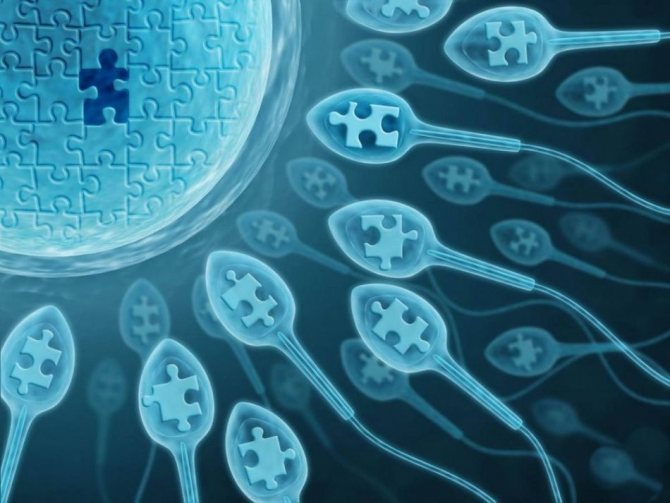Da!Zachatie
Website about pregnancy, from planning to birth
Popular
When can you plan a pregnancy after laparoscopy?
Home › Diagnostics
Unfortunately, biological partners are not always suitable for each other. A test for the compatibility of a couple for conception is done to avoid or to clarify possible pregnancy pathologies. It is useful to know what types of incompatibility exist, how to diagnose them and how to get pregnant if the result is negative.
- 1 Compatibility of partners - what is it
- 2 Diagnosis of immunological incompatibility and results
- 3 Is incompatibility a death sentence?
- 4 Summary
Partner compatibility - what is it?
Incompatibility of partners at conception indicates a conflict in the individual parameters of the body, which can negatively affect the attachment and subsequent gestation of the embryo. Based on this, compatibility is determined by the absence of such factors.
Compatibility analysis is necessary for those couples who do not become pregnant after regular unprotected intercourse for more than 1 year. Analysis of the compatibility of spouses is also carried out with the following factors:
- recurrent miscarriage;
- the egg is not fertilized;
- fading of fetal development.
Biological conflict of marital material is the cause of 20% of pregnancy pathologies. Doctors have identified the types and causes of possible incompatibility:
- Blood compatibility. The Rh factor and blood group are currently not difficult to correct causes of infertility, however, serious complications can arise during the 2nd and 3rd pregnancies. A conflict may arise if the mother is Rh negative and the father is Rh positive.
- Immunological incompatibility of spouses. When the functioning of the immune system is disrupted, both women and men can secrete antisperm antibodies. Most often, immunoglobulins are found in the mucus of the vaginal microflora; they prevent sperm from moving inside it, reduce motility and destroy it.
- Microflora incompatibility. When the bacterial balance is disturbed, the composition of the mucus changes, which leads to impaired sperm motility and destruction of their structure, which means the impossibility of the natural process of fertilization.
- Genetic compatibility. Every human cell contains a leukocyte antigen that protects it from dangerous agents. If the spouses have at least 2 alleles in their blood, the woman’s body will perceive the fetus as its own mutated cells and begin to attack it. Fortunately, such a biological conflict is possible only with consanguineous ties.
To understand why incompatibility between partners is possible, a number of studies should be conducted. To determine the compatibility of the Rh factors of the spouses, a general blood test is performed. To identify the presence of an immunological conflict between spouses, the Kurzrock-Miller test is intended, and a post-coital test should also be taken. To assess the state of the microflora of both partners, a smear is taken from the woman’s vagina and from the man from the urethra.
The establishment of genetic mutations is carried out through an expensive DNA test, so you should first be tested for the presence of other types of incompatibility.

Rhesus conflict
The problem is somewhat similar to biological incompatibility. In this case, the woman’s body tries to destroy not the sperm, but the already formed fetus. The reason is the Rh factor. It can be positive and negative.
In the first case, there are specific proteins (antigen D) on the red blood cells of a person, but in the second they are not.
If the mother’s Rh factor is negative, and the father’s, and subsequently the child’s, is positive, the woman’s immune bodies try to destroy the fetus’s blood cells. They consider squirrels an infection that needs to be gotten rid of. Because of this, hemolytic disease of the newborn develops.
But there are several positive points:
- Typically, Rh conflict develops only in the second pregnancy. When carrying a child for the first time, the woman’s immune system does not have time to produce the appropriate substances for an “attack.” But if there have been transfusions or other contacts with Rh-positive blood before, the conflict may appear during the first pregnancy.
- Negative consequences develop only towards the end of pregnancy or during childbirth, when the permeability of the placenta increases and the blood of the child and mother mixes. This gives enough time to identify and neutralize the danger.
- To check whether there is a risk of developing hemolytic disease, it is enough to take standard tests for antibodies at the antenatal clinic. It is also easy to check blood compatibility for conception in advance by finding out the Rh factor of both partners.
If a Rh conflict was detected during pregnancy, immunization is prescribed at 28 weeks. A woman is injected with anti-D gamma globulin, which destroys Rh-positive red blood cells in her blood before the immune system responds to them.

A similar procedure is repeated 3 days after birth. But the drug is already injected into the child. Another option to solve the problem is IVF. When choosing among fertilized eggs, the laboratory technician can only use Rh-negative ones.
Conflict never arises if the mother has a positive Rh factor or the father has a negative Rh factor. At the same time, you don’t have to worry about which blood groups are incompatible for a subsequent pregnancy. Such a problem simply does not exist.
Diagnosis of immunological incompatibility and results
An immunological factor is the cause of infertility in about 10% of diagnosed cases. The aggressive reaction of the protective mechanisms of the female body is associated with the biological titers of both partners. The emergence of antisperm antibodies in girls is possible in the presence of infections, disorders of the mucous membrane, AST in a man, or unprotected anal sex.
You can find out about the presence of AST by taking a test to determine the compatibility of partners for conception. To establish an immunological conflict, the following methods are used:
- Postcoital Shuvarsky-Sims-Guner test. A postcoital test is carried out 4-6 hours after intercourse has occurred, but the recommended sampling period is from 9 to 24 hours. For analysis, cervical mucus is taken with a sterile pipette in the gynecologist's office, and the condition of the sperm, their mobility, and the presence of antisperm antibodies are assessed during the study.
- Kurzrock-Miller test. To carry out the analysis, sperm and cervical mucus of the spouses are collected. Compatibility is checked by combining the biomaterial in the laboratory. A laboratory assistant spends 6 hours studying the interaction of liquids using a microscope. The results of the study are deciphered only by a doctor.
- Spermogram. Donating sperm is necessary to determine the number of sperm, their motility, morphological characteristics, number and type of leukocytes, immature sperm cells, etc. Macroscopic parameters of the biomaterial are analyzed - sperm volume, color, liquefaction time and viscosity of the ejaculate, pH.

Before performing the Kurzrock-Miller test, it is advisable to take a microflora smear for both partners, abstain from sexual intercourse for 3 days, and stop using local medications.
What is genetic incompatibility and what danger does it pose?
A diagnosis of “genetic incompatibility” does not mean that a couple cannot conceive a child. Typically, both fertilization and implantation occur as with any natural pregnancy. Disorders usually appear from the moment the embryo develops, and then during the pregnancy the pregnancy is terminated in the early stages, usually in the first 10 weeks. If the situation repeats several times, a diagnosis of “recurrent miscarriage” can be made and the spouses are referred to a geneticist.
Why is this happening? - If the genes of the father and mother are different, the pregnancy continues. The body understands that half of the child’s genes are from the mother, half from the father. An immunological reaction to the continuation of pregnancy appears.
— If the genes of the future parents are similar, then the body turns on a protective mechanism in response to embryo implantation.
Is incompatibility a death sentence?
Incompatibility at conception is the cause of 20% of diagnosed cases of infertility. To make such a diagnosis, a compatibility test for conception is performed. Currently, medicine is able to overcome numerous obstacles when planning children and, depending on the cause of incompatibility, the doctor determines treatment methods for each specific couple.
Conflict of Rh blood is the most easily eliminated factor. If the wife has a negative blood type, and the husband has a positive one, then when expecting a second child, an immunoglobulin injection is administered, which reduces the quality of the woman’s body’s response to the fetus. This injection is given 2 times - at 28 weeks of pregnancy and immediately after childbirth.
It is easy to get pregnant if there is microflora incompatibility. Since the motility and number of surviving sperm depends on the state of the microflora of the genital organs, you can simply “tighten up” these indicators. If the result is negative, the doctor prescribes antibacterial, anti-inflammatory drugs and probiotics.
In case of genetic incompatibility of partners, fertilization is possible using auxiliary methods with donor material.

It is impossible to cure immunological pathology, since antibodies are the body’s memory of hostile bodies. The immunological conflict for conceiving a child can be circumvented by prolonged isolation of seminal fluid during sexual intercourse, while taking antihistamines or corticosteroids.
Reasons: removable and irreparable
Doctors do not immediately confirm possible genetic or any other incompatibility between spouses. Before such a diagnosis is made, at least a year of unsuccessful attempts to conceive and bear a child must pass.
But even in this case, first the partners must undergo an examination and determine the cause of the problem.
Most often this is:
- Infertility of a couple. There are many causes of the disease. To exclude it, you need to undergo a comprehensive examination and make sure that both partners are healthy.
- Reluctance. It is not uncommon for one of the partners to secretly use contraceptives. In this case, medicine is powerless.
- Stress. Often it is enough for a mother to change her nervous and stressful work to a calmer one for all problems with “incompatibility” to disappear.
If it turns out that both partners passionately desire a child, are not sick and lead a healthy lifestyle, then a compatibility test is prescribed.
Depending on the specific reasons for which the pregnancy is terminated, an appropriate set of tests is selected and treatment is prescribed.
Bottom line
Analysis of partner compatibility includes the study of the aggressive reaction of the female body to the penetration of sperm. To establish the cause of infertility, it is necessary to take into account the types of incompatibility and diagnostic methods:
- Immunological factor - determined by passing the Kurzrock-Miller test and postcoital compatibility test.
- Disturbance of the bacterial balance of microflora - for examination, a smear is made from the vagina and material is taken from the urethra.
- Blood compatibility - a general blood test to determine the Rh factor.
- Genetic factor - studied by analyzing the DNA of both partners.
After determining the cause of infertility, the doctor must prescribe treatment to correct the biomaterial or recommend auxiliary fertilization techniques. All types of incompatibility can be circumvented with the right approach.
Useful video about compatibility testing for pregnancy
List of sources:
- Boldyreva M.N. HLA (class II) and natural selection. “Functional” genotype, hypothesis of the advantage of “functional heterozygosity”. Dissertation for the degree of Doctor of Medical Sciences, 2007.
- Male factor infertility: algorithm for laboratory diagnosis of causes (part 2). Rykova O. V. 2021 / International Journal of Endocrinology.
- Modern approaches to the diagnosis and treatment of infertility. Kondratyeva T. A., Artymuk N. V. 2009 / Mother and child in Kuzbass.
- Barkovsky D. HLA system and neuroimmunoendocrine factors. Effect on pregnancy and childbirth. Publishing house Medpraktika-M, 2014. Pp. 374.
Medical edition:
Site experts
Author
Lyudmila Sheveleva
Author of the portal Mama66.ru
The site administration does not operate in the field of medical services. Consultations and recommendations are for informational purposes only and do not constitute full medical assistance. Any medical care is provided only in specialized medical institutions. If you have any symptoms, consult a doctor.
Share
How to get pregnant if you have immune incompatibility with your husband?
At the moment, the problem of immune incompatibility has not been fully studied to this day. What is known is that a negative reaction of a woman’s body to male cells occurs at the first contact and this can happen to absolutely any couple.
INTERESTING: In some cases, such rejection of male cells occurs due to psychological stress (fear of pregnancy or children, for example).
Less commonly, immune incompatibility is provoked by hormonal disorders in a woman’s body, both periodic and chronic. In order to avoid problems with pregnancy planning and pathologies of fetal development, you should undergo special tests and additional studies before conception.

Compatibility of men and women in planning a child











